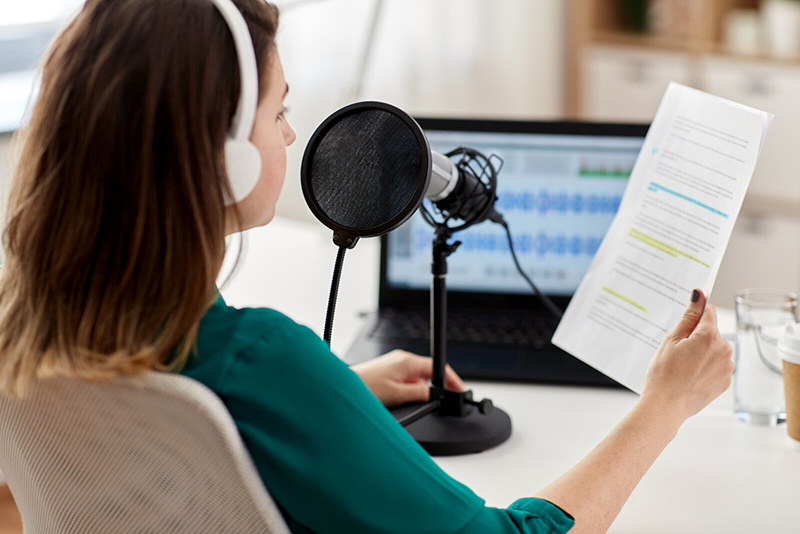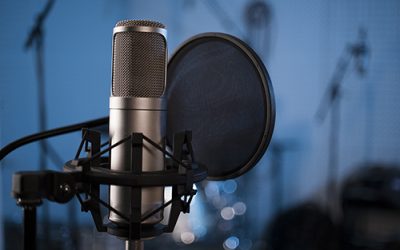Remote recordings offer the advantage of booking podcast guests who might be challenging to interview in person. By investing a bit of upfront preparation, you can ensure a remarkable podcast episode and significantly enhance the overall quality of your remote interview. Here are some tips to consistently achieve quality recordings. Clear audio enhances the effectiveness of podcast transcription, allowing for better audience engagement and maximizing the impact of remote interviews.
Tips for Conducting and Recording Remote Podcast Interviews
Prepare well
Prepare thoroughly for your remote podcast guest interview by conducting comprehensive research on your guest and their work beforehand – check their social media profiles or personal website, or search for their latest projects or publications. While you can maintain an element of surprise to encourage genuine dialogue, not being prepared with the right questions can come across as unprofessional. Write a concise bio to promote the interview. Outline the key topics and prepare specific questions based on what you want your audience to hear from them. Tell your guest about the topics you intend to cover and invite their input on any specific subjects they wish to discuss. This collaborative approach can help you develop your interview questions. Creating a podcast script can serve as a useful reference during the interview process. Schedule the interview at a convenient time for your guest and communicate your recording plans clearly.
Take Care of the Technical Aspects
Pay attention to the following technical aspects when recording remote podcast interviews:
Internt connection: Ensure both you and your guests have a strong internet connection. If you have more than one guest, try to have all parties stay in one spot once they establish a strong internet connection. Avoid walking around or driving while recording. When it comes to equipment, here’s what you should have:
Microphone: Using the right equipment is necessary to ensure that the interview will sound clear and consistent. First, get a quality microphone and headphones. For superior sound, invest in a plug-and-go microphone that works by plugging the USB cable into your computer. Cost-effective options include Blue Yeti, Rode Podcaster, and Apogee Mic+. Many microphones work on smartphones too. In fact, while smartphones do have built-in microphones, if you want professional sounding audio, get a quality external microphone.
Headphones: Using a good pair of podcast headphones is important to monitor the audio picked up by your mic and control the sound. Choose your headphones based on audio quality, convenience and your budget. Make sure your headphones are lightweight and come with padding around the ears. Quality headphones will suppress distracting low-level sounds. Ask your guest to wear headphones to prevent echo and ensure that they can hear you clearly.
Recording software: When selecting remote recording software, consider your priorities. Do you want the highest audio quality possible or is video capability more important? Zoom is popular for video conferencing due to its widespread familiarity. Inviting guests and recording on Zoom is simple, with apps available for various devices. However, Zoom compresses audio, potentially affecting recording quality. Alternatives include Google Hangouts and Microsoft Teams.
For remote podcast recording, specialized software offers high-quality audio and video capture. You’ll need an internet connection, software subscription, podcast microphone, headphones, and a computer or smartphone. Remote recording tools like Squadcast and Riverside, often Chrome-based, streamline the process without requiring guest downloads, ensuring professional interviews.
Choose the option that best meets your needs and makes it easy for your guests to take the call. Video is important if you need to post your podcasts on social media or YouTube because people love watching faces.
Ensure a Quiet Setting
Choosing a quiet place to record the podcast interview is crucial for both you and your guest. If the recording is being done at home, it’s very likely, it is likely that there will be some background noises and this will be picked up by the mic. Pick a room away from traffic noises, humming from an AC unit or fan, etc. Apply DIY acoustic treatments to walls, or fill the room with furniture and rugs to absorb reverberant noise. Use a dynamic XLR or USB microphone with a pop filter. Dynamic mics pick up less ambient sound and a smaller range of frequencies. Pop filters help minimize harsh plosives.
Ensure Quality Transcripts of Your Podcast Recording
Podcasting has evolved significantly, transitioning from mere content delivery to serving as a versatile tool for achieving creative and marketing objectives. These strategies can help you record your remote podcasts efficiently. Once recorded and edited, transcribing your podcast is crucial for improving search visibility. Choosing an experienced audio transcription company can ensure that your audio/video recordings are converted into accurate text, maximizing the potential of your podcasts.
Transform your podcast interviews into quality, searchable text with our expert podcast transcription services!




